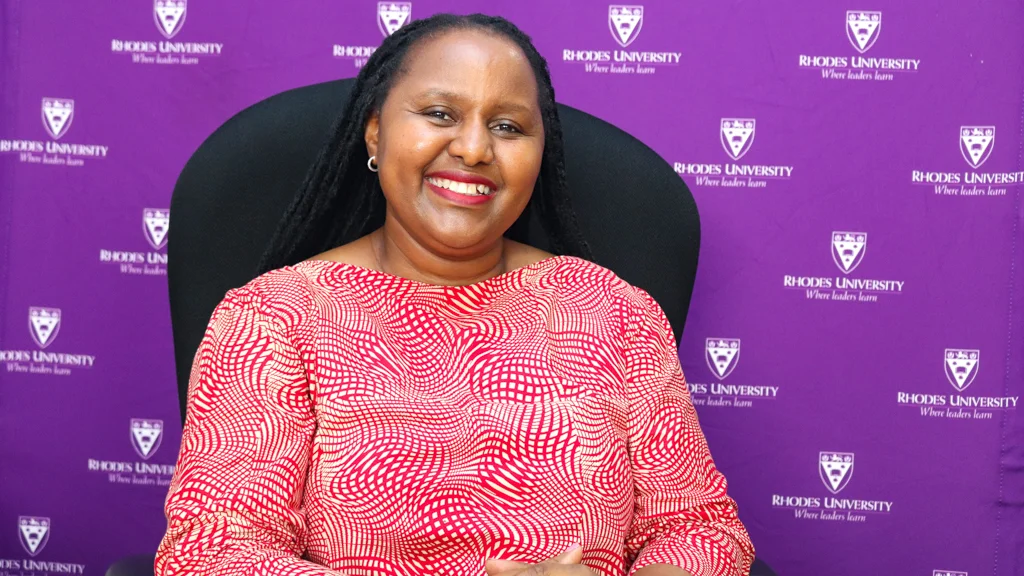
Rhodes University is delighted to announce that Dr Nomakwezi Mzilikazi will assume her role as the new Deputy Vice-Chancellor for Research, Innovation and Strategic Partnerships on 1 July 2023. She succeeds Professor Joanna Dames who served as the Interim Deputy Vice-Chancellor: Research, Innovation & Strategic Partnerships since the retirement of Prof Peter Clayton at the end of 2022, following 40 years of service to the University.
Born and raised Idutywa in the former Transkei, Dr Mzilikazi obtained her undergraduate qualification, Bachelor of Science degree, majoring in Zoology and Chemistry from the University of Transkei (now Walter Sisulu University). She proceeded to do her honours degree in Zoology at the same university before moving to the then-University of Natal (now University of KwaZulu-Natal) to pursue her Master’s and subsequently PhD studies in Zoology. She won the inaugural Women in Science award as a PhD candidate.
Dr Mzilikazi spent six years at the Lovegrove laboratory where she worked with the late Professor Barry Lovegrove, an A-rated scientists, specialising in evolutionary physiology. She graduated to become the first Black evolutionary physiologist on the continent.
Following the completion of her PhD, she joined Nelson Mandela University (NMU). “Because I had come straight from PhD to a lecturing position, I negotiated with the University to give me some time to pursue postdoctoral studies abroad,” Dr Mzilikazi says.
She was awarded the prestigious Alexander von Humboldt fellowship to undertake postdoctoral research at Philipps University Marburg in Germany where she spent two years.
Upon returning to NMU, she became the first Black person, the only female, and the youngest staff member at the NMU Zoology Department at the time.
In 2012 Dr Mzilikazi joined the University of Pretoria as the Head of the Graduate Support Hub where she increased the National Research Foundation (NRF) postgraduate funding applications from 287 in 2012, to 786 in 2013. The University received a four percent increase in the overall share of the NRF postgraduate funding during this time, moving its allocation from R20.3 million to R60 million.
In 2014, she became the Director of the South African PhD Project within the Human and Infrastructure Capacity Development directorate of the NRF. Her responsibilities included creating opportunities for South Africans to undertake doctoral studies in the country, abroad and in a split-site mode.
She worked with stakeholders such as the Department of Science and Technology, the Department of Higher Education and Training, the US Embassy, the Association of Commonwealth Universities, NUFFIC for the SA-Netherlands Doctoral study programme, and the French Embassy.
In 2017, still at NRF, Dr Mzilikazi became a Director for Strategy, Planning and Partnerships. In this role, she was responsible for providing macro-organisational system planning, foresight, evaluation and reporting on national research needs, trends, and interests within and across disciplines and knowledge fields. She was also responsible for assessing the state and development needs of individual institutions as well as the interventions required to enable them to be responsive to the dynamics of a differentiated higher education sector.
In 2018, Dr Mzilikazi re-joined NMU as the Director of Research Support and Management. Among her responsibilities, she oversaw strategic initiatives and partnerships within the Research, Innovation and Internationalisation portfolio. “An important focus of the post was to provide a strategic support base for the research chairs,” she says.
Dr Mzilikazi is proud of her and her team's track record at NMU. “Working closely with the DVC, we have transformed research leadership and research chairs. When I joined, we had 35% Black research chair holders, we now have 50% Black chair holders. Back then, more than 70% of them were males and we now have a 50% / 50% split between men and women.” says Dr Mzilikazi.
Dr Mzilikazi holds Rhodes University’s research output in high esteem. “The University has done very well to cement a reputation as a research-intensive university. It is a place where nobody needs to be convinced to do research, and that excites me. Despite the sectoral and institution-specific challenges, I think there is an opportunity to contribute to change,” explained Dr Mzilikazi.
She says the opportunity to contribute to change arises from the fact that “Rhodes University is very comfortable with who it is. We need to move out of the ‘maintenance mode’ towards further ‘strengthening and improvement’. We need to improve in profiling our research leadership and activities. We need to aggressively ensure that Rhodes University is sustainable in its research reputation built by the ageing cohort. We need to get into an accelerated growth and transformation phase in terms of research at Rhodes University. We need to tap into the innovation side of research. We need to see how to identify, protect and leverage the excellent research produced to commercialise it for the benefit of the institution, the individual/s who produced the research and the local community,” says Dr Mzilikazi.
Dr Mzilikazi says a lot of work needs to be done to ensure that Rhodes University is even more vocal and visible about all that makes it such a great institution.
Vice-Chancellor, Professor Sizwe Mabizela, says the Rhodes University community looks forward to welcoming Dr Mzilikazi.
“We take much delight in welcoming Dr Kwezi Mzilikazi to Rhodes University. We are excited that she will be joining our senior leadership team. She brings with her substantial experience, knowledge and leadership acumen that will take us to the next stage in pursuit of our academic vision, mission, and purpose. We look forward to her contribution to the University as we further consolidate our place as a distinct and distinctive institution of higher learning that is locally responsive and globally engaged. We welcome her warmly to a place of hope, a place that inspires imagination, a place that nurtures creativity, a place where ideas matter and a place where leaders learn.”
Dr Mzilikazi speaks: foreshadows #RU120 anniversary

